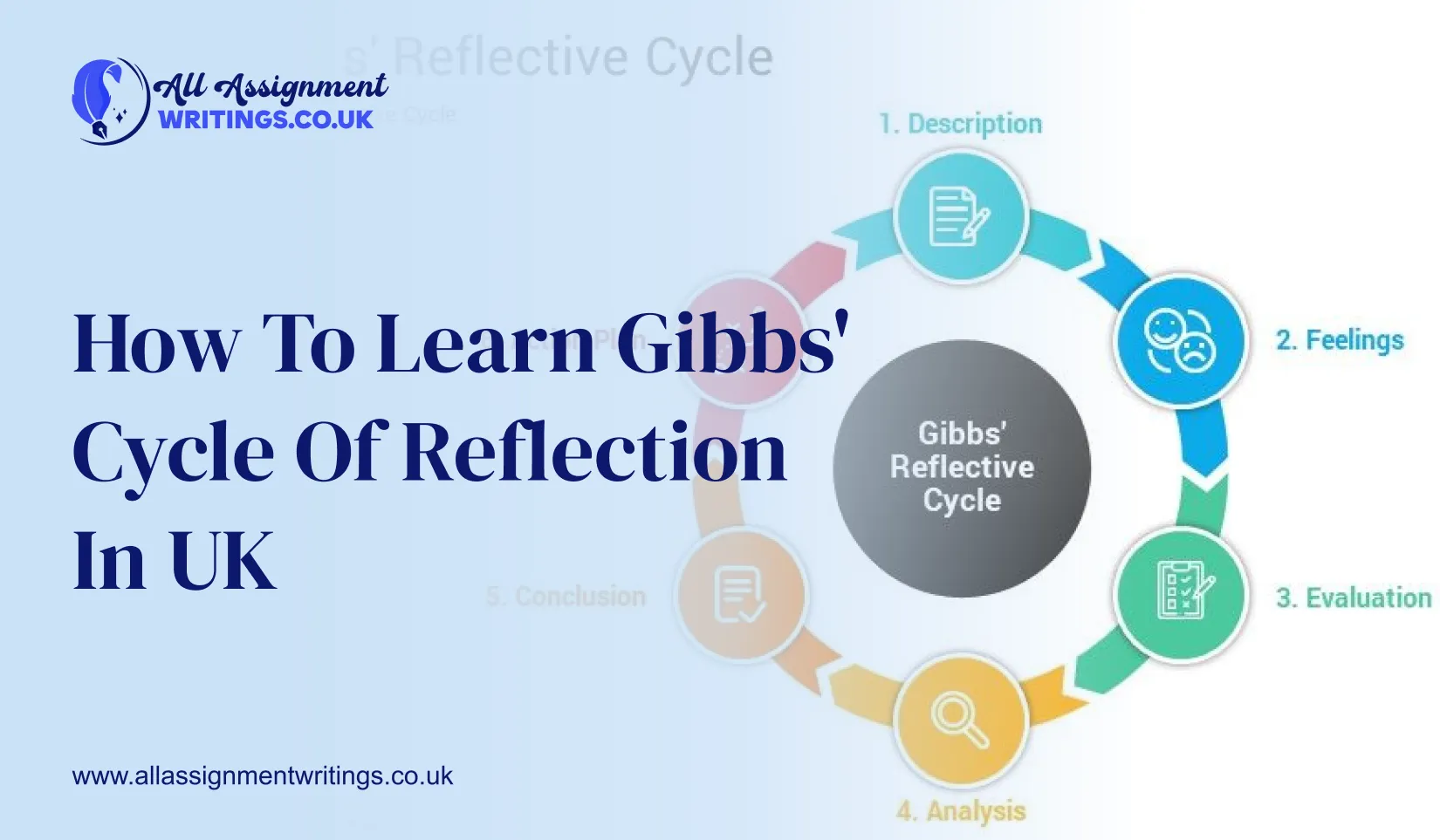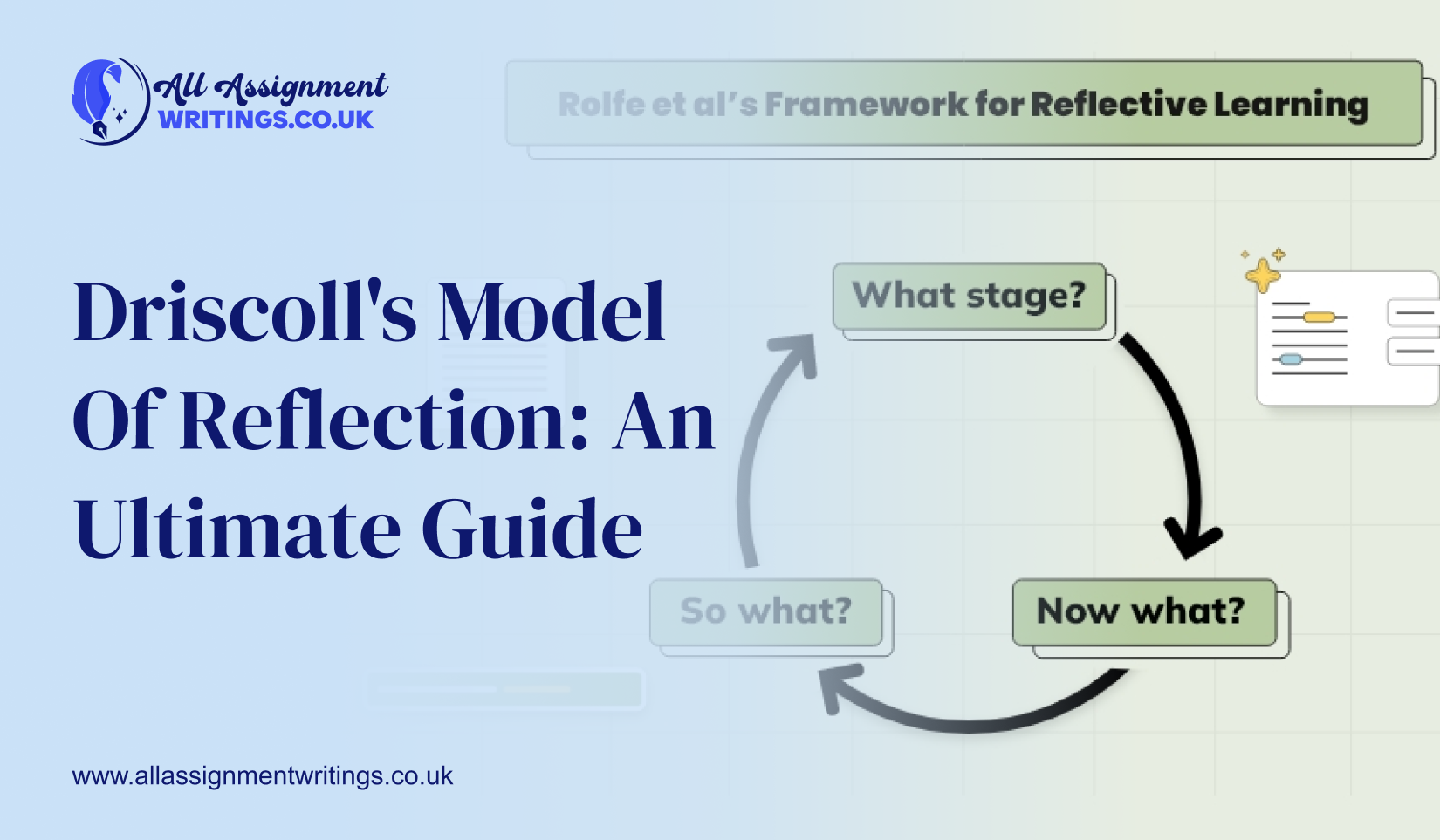Mastering Reflection: Understanding Gibbs’s Reflective Cycle in Nursing Practice in the UK: A Complete Tutorial.
It remains an understated fact that reflection is instrumental for professional development in the context of nursing practice in the NHS of the UK. NMC advised all nurses to adhere to some elements of CPD particularly the concept of reflective practice. This guide focuses on Gibbs’ Reflective Cycle, a popular method in the current research that helps nurses reflect on situations, learn from mistakes, and plan for future involvement.
Understanding Gibbs’ Reflective Cycle
Graham Gibbs in 1988 developed the Gibbs Reflective Cycle which is a six-stage model of reflection which is used as a framework for writing in experiential learning. It is used to facilitate nurses in identifying, analyzing and solving a particular clinical situation to provide deeper meaning and knowledge that can be applied in future situations.
The Six Phases of Gibbs Phase Cycle of Reflection in Nursing Practice.
1. Description:
This is the initial phase where the writer provides a brief overview of the feature experience being discussed. State facts including the time and place, the individual actors, and what was done.
Example: “I am a third-year student in the institution and I was attending to a patient who was a 72-year-old male patient who was newly admitted and was diagnosed with pneumonia Mr. Jones was exhibiting signs of anxiety and respiratory distress”.
2. Feelings:
Think about how you have felt as a participant in the given experience. Remember your feelings and place yourself emotionally in the shoes of the persons involved.
Example: I felt a little concerned about Mr. Jones and thought he had a respiratory infection.
3. Evaluation:
This stage consists of a stage of self-assessment of one’s actions. Reflect on the aspects of the experience that were successful and the sections in need of improvement.
Example: In terms of his initial assessment Mr. Jones’ was identified to present with the signs and symptoms of lung cancer and oxygen therapy was applied as appropriate yet I should have been more proactive in stressing Mr Jones’ anxiety to the attending physician.
4. Analysis:
Finally, look for answers to the question “why” regarding the experience. Reflect on relevant theories or literature in the field and research evidence or practice standards available for the situation.
Example: “Mr. It is possible to assume that Jones being in an unfamiliar environment and the physical pain he experienced had caused him anxiety. Patient-centred Care: Communication guidelines from the NMC and NHS could have reduced his anxiety.
5. Conclusion:
Summarize your reflection and be able to formulate conclusions. What were the lessons that you learnt during the experience?
Example: This revealed to me the need to cater to not only the physical but emotional needs of the patients as well and therefore even in the future I will ensure that I clearly communicate and exhibit empathy towards patients when carrying out the treatment.
6. Action Plan:
Develop a specific strategy for using the developed concepts in the future. How can you implement these findings in your work?
Example: In addition, I would seek to actively explore communication strategies that have been proven effective in preventing and managing patient anxiety, as well as document my observations of anxiety and the co-occurring physical symptoms.
Improving Reflection: A Practical Guide for Nursing Students in the United Kingdom.
Specificity is Key: Select a particular concrete event that happened to you, not just abstract circumstances. This helps in studying the case in detail and it makes it easy to know the specific areas that require improvement.
Maintaining Objectivity: Express your emotions but at the same time maintain objective opinions. Consider such use of evidence and observation to justify the analysis professionally.
Alignment with Professional Standards: Reflect on your learning concerning the NMC guidelines and the best practices in the NHS. Be able to show evidence of understanding how nursing is regulating in the UK.
Reflective Language: Consider phrases that recognize your view as the writer, including: ‘I think,’ ‘In my opinion,’ ‘This might imply’ ‘This appears to be’ etc. Do not use colloquialisms and emotional language and stay formal throughout the essay.
Maintaining a Reflective Journal: I also recommend you start maintaining a reflective journal about your learning process. Reflective journals are suits for this because it is easier to spot certain themes or areas for further improvement when you compare the notes from various occasions.
Further Relevant Sources For UK Nurses
Nursing and Midwifery Council (NMC): The use of the NMC website is recommends for guidance for the concept of reflective practice for nurses as well as resources and frameworks providing: https://www.nmc.org.uk/
The King’s Fund: This healthcare think tank linked to reflective practice in nursing in the UK with resources on their site: https://www.kingsfund.org.uk/
HEE – Health Education England: CPD resources for nurses in the UK offered by HEE and used in the program often involved reflective practice exercises: https://www.hee.nhs.uk/
A Generous Wrap-Up for UK Nursing Practice,
Nursing Assignment Writer UK
Nursing in the United Kingdom’s dynamic healthcare environment means that you will come across a myriad of opportunities and challenges along the way. Applying Gibbs’ Cycle of Reflection enables you to use these experiences from our professional Nursing Assignment Writer UK advantages and to ensure ongoing development both personally and professionally towards a goal of elevating the quality of care delivered to patients.
Keep in mind that reflection is not a one-time exercise; rather, it is a process. When you pass through the six stages of the cycle, adopt a positive attitude of being inquisitive and keen to learn. It is also important to understand that negative experiences should not be avoiding, they offer chances for one to improve.
Beyond the Framework
Although Gibbs’ Reflective Cycle represents a useful framework for reflection, the whole process is necessarily subjective. Try out several strategy approaches until you find one that works for you – perhaps personal journaling, mind maps or creative writing tasks.
Building a Supportive Community
Reflection does not have to be conducting in a lonely environment. Talk about the issues with your workmates, mentors, or reflective practice groups within the NHS or your nursing union. Storytelling and especially sharing successful stories creates a learning environment. Where people are open to discussing things and offering new opinions.
The Impact of Reflection
Reflective practice is important as it boosts one’s competence and also assists in promoting competence among others in the NHS. Your determination to learn results in better patient satisfaction and better communication between healthcare professionals. Which feeds into a better functioning system for the well-being of the population in the UK.
So, start your reflective journey with the confidence. That you have a chance to improve and develop your nursing profession skills with each experience. It is important to remember that the most diligent and caring nurses are those who do not stop learning. and reflection opens the door to the right development throughout a nurse’s career.








